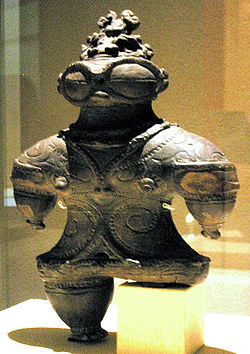It looks like you're using an Ad Blocker.
Please white-list or disable AboveTopSecret.com in your ad-blocking tool.
Thank you.
Some features of ATS will be disabled while you continue to use an ad-blocker.
share:
First before I go fwd , a disclaimer, this is not my position and I entertained no such idea, but of Chinese geochemist Sun Weidong , very close to
what I term "Afro-eccentric" which embodies all kinds of crazy , rather than Afrocentric which look at history from an African perspective so
here goes.
foreignpolicy.com... tity/
You guys had better klik the link for more including a burial pit, also what I didn't know was that is a long standing argument going back over a hundred yrs and involve aspect of emergent Chinese nationalism.
Incidentally the late Martin Bernal claimed the dispersal of the Hyksos following the restoration 17th-18th dynasties had great impact throughout the Med and even beyond.
Take your time read through the link it's important that you do.
On a cool Sunday evening in March, a geochemist named Sun Weidong gave a public lecture to an audience of laymen, students, and professors at the University of Science and Technology in Hefei, the capital city of the landlocked province of Anhui in eastern China. But the professor didn’t just talk about geochemistry.
He also cited several ancient Chinese classics, at one point quoting historian Sima Qian’s description of the topography of the Xia empire — traditionally regarded as China’s founding dynasty, dating from 2070 to 1600 B.C. “Northwards the stream is divided and becomes the nine rivers,” wrote Sima Qian in his first century historiography, the Records of the Grand Historian. “Reunited, it forms the opposing river and flows into the sea.” In other words, “the stream” in question wasn’t China’s famed Yellow River, which flows from west to east. “There is only one major river in the world which flows northwards. Which one is it?” the professor asked. “The Nile,” someone replied. Sun then showed a map of the famed Egyptian river and its delta — with nine of its distributaries flowing into the Mediterranean.
This author, a researcher at the same institute, watched as audience members broke into smiles and murmurs, intrigued that these ancient Chinese texts seemed to better agree with the geography of Egypt than that of China.
In the past year, Sun, a highly decorated scientist, has ignited a passionate online debate with claims that the founders of Chinese civilization were not in any sense Chinese but actually migrants from Egypt. He conceived of this connection in the 1990s while performing radiometric dating of ancient Chinese bronzes; to his surprise, their chemical composition more closely resembled those of ancient Egyptian bronzes than native Chinese ores.
Both Sun’s ideas and the controversy surrounding them flow out of a much older tradition of nationalist archaeology in China, which for more than a century has sought to answer a basic scientific question that has always been heavily politicized: Where do the Chinese people come from? Sun argues that China’s Bronze Age technology, widely thought by scholars to have first entered the northwest of the country through the prehistoric Silk Road, actually came by sea. According to him, its bearers were the Hyksos, the Western Asian people who ruled parts of northern Egypt as foreigners between the 17th and 16th centuries B.C., until their eventual expulsion.
He notes that the Hyksos possessed at an earlier date almost all the same remarkable technology — bronze metallurgy, chariots, literacy, domesticated plants and animals — that archaeologists discovered at the ancient city of Yin, the capital of China’s second dynasty, the Shang, between 1300 and 1046 B.C. Since the Hyksos are known to have developed ships for war and trade that enabled them to sail the Red and Mediterranean seas, Sun speculates that a small population escaped their collapsing dynasty using seafaring technology that eventually brought them and their Bronze Age culture to the coast of China.
foreignpolicy.com... tity/
You guys had better klik the link for more including a burial pit, also what I didn't know was that is a long standing argument going back over a hundred yrs and involve aspect of emergent Chinese nationalism.
In some ways, Sun’s current theory is an unintended result of the Chronology Project’s scientific rigor. At the project’s launch in 1996, he was a Ph.D. student in the radiation laboratory of the University of Science and Technology. Of the 200 or so items of bronze ware he was responsible for analyzing, some came from the city of Yin. He found that the radioactivity of these Yin-Shang bronzes had almost exactly the same characteristics as that of ancient Egyptian bronzes, suggesting that their ores all came from the same source: African mines. Perhaps anticipating serious controversy, Sun’s doctoral supervisor did not allow Sun to report his findings at the time. Sun was asked to hand over his data and switched to another project. Twenty years after the start of his research and now a professor in his own right, Sun is finally ready to say all he knows about the Yin-Shang and China’s Bronze Age culture.
Incidentally the late Martin Bernal claimed the dispersal of the Hyksos following the restoration 17th-18th dynasties had great impact throughout the Med and even beyond.
Take your time read through the link it's important that you do.
edit on 2-9-2016 by Spider879 because: (no reason given)
Can't be Egypt because Egypt is a desert. They say true civilization began in the Middle East. Sumerians. It is obviously Sumerians who migrated West
and East.
originally posted by: makemap
Can't be Egypt because Egypt is a desert. They say true civilization began in the Middle East. Sumerians. It is obviously Sumerians who migrated West and East.
Look at all of the green. Green is not desert!
Research is your friend. It can change peoples opinion of your posts!
P
a reply to: Spider879
Northern Africans is a mix of Semitic and sub-saharan Africans, Sumerians ( known as black-head ) were likely from India.
Trading route stretching from Ancient egypt ( and its gigantic fields ) to China..
Its not that hard to see when things progressed, when did China enforce cultural laws?
Northern Africans is a mix of Semitic and sub-saharan Africans, Sumerians ( known as black-head ) were likely from India.
Trading route stretching from Ancient egypt ( and its gigantic fields ) to China..
Its not that hard to see when things progressed, when did China enforce cultural laws?
I think it's possible.
I know we're still barely scratching the surface of human history.
In a high tech world where info flies fast, it seems like we've figured out tons.
But on a Galactic Scale of Truth from 1-100 (100 being knowing of everything about the universe) we probably have not even cracked 1 yet, I would grade us 0.001 on that scale.
I truly believe everything (most, if not all) will be looked at as archaic and pretty much barbaric and laughable about how much we think we know(in our time).
I don't know the truth but I know the patterns. History is muddled with biased writings. And I truly feel our era will go down as one of the most muddled in our hopefully long and storied TRUE history.
I know we're still barely scratching the surface of human history.
In a high tech world where info flies fast, it seems like we've figured out tons.
But on a Galactic Scale of Truth from 1-100 (100 being knowing of everything about the universe) we probably have not even cracked 1 yet, I would grade us 0.001 on that scale.
I truly believe everything (most, if not all) will be looked at as archaic and pretty much barbaric and laughable about how much we think we know(in our time).
I don't know the truth but I know the patterns. History is muddled with biased writings. And I truly feel our era will go down as one of the most muddled in our hopefully long and storied TRUE history.
originally posted by: makemap
Can't be Egypt because Egypt is a desert. They say true civilization began in the Middle East. Sumerians. It is obviously Sumerians who migrated West and East.
First off who ever told you that, lied to you, Egypt have a nice strip of green with probably the most fertile soil on the planet bringing down soot from Ethiopia , Sumer was also in a desert in what is now known as Iraq and Kuwait..trust me I'v been there.
I do not rule out contacts, ppl will travel.
edit on 2-9-2016 by Spider879 because: (no reason given)
a reply to: Spider879
Something happened in ancient Mesopotamia that brought about human intelligence. What was it? Who knows, maybe god, maybe aliens. Well, ancient Sumer is the start of recorded history, but not the start of life nor the planet in general. I'm not saying it was aliens...but...
Something happened in ancient Mesopotamia that brought about human intelligence. What was it? Who knows, maybe god, maybe aliens. Well, ancient Sumer is the start of recorded history, but not the start of life nor the planet in general. I'm not saying it was aliens...but...
originally posted by: Vector99
a reply to: Spider879
Something happened in ancient Mesopotamia that brought about human intelligence. What was it? Who knows, maybe god, maybe aliens. Well, ancient Sumer is the start of recorded history, but not the start of life nor the planet in general. I'm not saying it was aliens...but...
Not any more so than other areas of the globe, it's simple , when ppl pick up farming and herding, population expand , sooner or later a big man, or a big woman began to organize them, this need not come from another star.
edit on 2-9-2016 by Spider879 because: (no reason given)
originally posted by: AdmireTheDistance
originally posted by: Vector99
a reply to: Spider879
Something happened in ancient Mesopotamia that brought about human intelligence.
Nonsense. Modern humans (complete with modern intelligence) have been around for hundreds of thousands of years.
First references to a society is no more than 10kya, first cultural norms about the same time. Then enforced cultural laws,
Before that it was a hunter, gatherer nomadic lifestyle.. Latest reference Native Indians..
Since B12 is critical to the growth of the brain, i would likely guess our first society was breeding cattle.
originally posted by: AdmireTheDistance
originally posted by: Vector99
a reply to: Spider879
Something happened in ancient Mesopotamia that brought about human intelligence.
Nonsense. Modern humans (complete with modern intelligence) have been around for hundreds of thousands of years.
So they just decided to start keeping decipherable records 6,000 years ago in ancient Sumer?
I don't doubt humans in general have been around for hundreds of thousands of years, we keep finding more and more evidence for it.
BUT,(and a big but) something happened 16-17 thousand years ago that set human evolution on an irreversible path of learning.
edit on 3-9-2016
by Vector99 because: forgot ones, 16k-17k years ago!
Altogether I agree and also don't believe
the ancient Chinese originated in the Nile Delta.
I do think China is going through
it's rebirth and patriotism is being pushed.
Exceptionalism is how this is done.
Why it was we Chinese who built the greatest
structures on Earth of course !
Maybe they can go back to Nepal and get
better measurements and eye color charts
than the Nazi's.
That was exceptionalism to the inth degree.
the ancient Chinese originated in the Nile Delta.
I do think China is going through
it's rebirth and patriotism is being pushed.
Exceptionalism is how this is done.
Why it was we Chinese who built the greatest
structures on Earth of course !
Maybe they can go back to Nepal and get
better measurements and eye color charts
than the Nazi's.
That was exceptionalism to the inth degree.
originally posted by: tikbalang
originally posted by: AdmireTheDistance
originally posted by: Vector99
a reply to: Spider879
Something happened in ancient Mesopotamia that brought about human intelligence.
Nonsense. Modern humans (complete with modern intelligence) have been around for hundreds of thousands of years.
First references to a society is no more than 10kya, first cultural norms about the same time. Then enforced cultural laws,
Before that it was a hunter, gatherer nomadic lifestyle.. Latest reference Native Indians..
Since B12 is critical to the growth of the brain, i would likely guess our first society was breeding cattle.
Yet H.Gs can do remarkable things like build Gobeki Tepi or Jomon era Japanese that had complex societies without farming or husbandry

Jomon late era statue ..
Yeah I throw that in there to stir the pot..
I kinda figured that the Chinese were the first civilisation
No real reason for that other than population size
Maybe they came out of the dessert, explains the epicanthic fold
No real reason for that other than population size
Maybe they came out of the dessert, explains the epicanthic fold
new topics
-
Advice for any young Adult .
General Chit Chat: 38 minutes ago -
Joe meant what he said about Hunter's pardon....
US Political Madness: 1 hours ago -
Regent Street in #London has been evacuated due to a “bomb threat.”
Other Current Events: 2 hours ago -
It’s Falling…
Philosophy and Metaphysics: 3 hours ago -
Steering the Titantic from the Drydock.
Rant: 6 hours ago
top topics
-
Steering the Titantic from the Drydock.
Rant: 6 hours ago, 10 flags -
Hearing more ambulances lately
Medical Issues & Conspiracies: 17 hours ago, 8 flags -
Los Angeles brush fires latest: 2 blazes threaten structures, prompt evacuations
Mainstream News: 17 hours ago, 7 flags -
Paramilitary Leaks - John Williams
Whistle Blowers and Leaked Documents: 15 hours ago, 7 flags -
Joe meant what he said about Hunter's pardon....
US Political Madness: 1 hours ago, 7 flags -
It’s Falling…
Philosophy and Metaphysics: 3 hours ago, 4 flags -
Advice for any young Adult .
General Chit Chat: 38 minutes ago, 4 flags -
Some sausage, some chicken, some sauce, some onions and some garlic...and some peppers!
Food and Cooking: 17 hours ago, 3 flags -
Regent Street in #London has been evacuated due to a “bomb threat.”
Other Current Events: 2 hours ago, 3 flags
active topics
-
Steering the Titantic from the Drydock.
Rant • 32 • : Boomer1947 -
Joe meant what he said about Hunter's pardon....
US Political Madness • 8 • : BeyondKnowledge3 -
Advice for any young Adult .
General Chit Chat • 3 • : AlroyFarms -
Regent Street in #London has been evacuated due to a “bomb threat.”
Other Current Events • 3 • : TimBurr -
Los Angeles brush fires latest: 2 blazes threaten structures, prompt evacuations
Mainstream News • 20 • : BeyondKnowledge3 -
Russia Ukraine Update Thread - part 3
World War Three • 6902 • : Oldcarpy2 -
It’s Falling…
Philosophy and Metaphysics • 2 • : JJproductions -
Hearing more ambulances lately
Medical Issues & Conspiracies • 4 • : JJproductions -
Meta Llama local AI system is scary good
Science & Technology • 51 • : imitator -
Judge rules president-elect Donald Trump must be sentenced in 'hush money' trial
US Political Madness • 65 • : network dude



